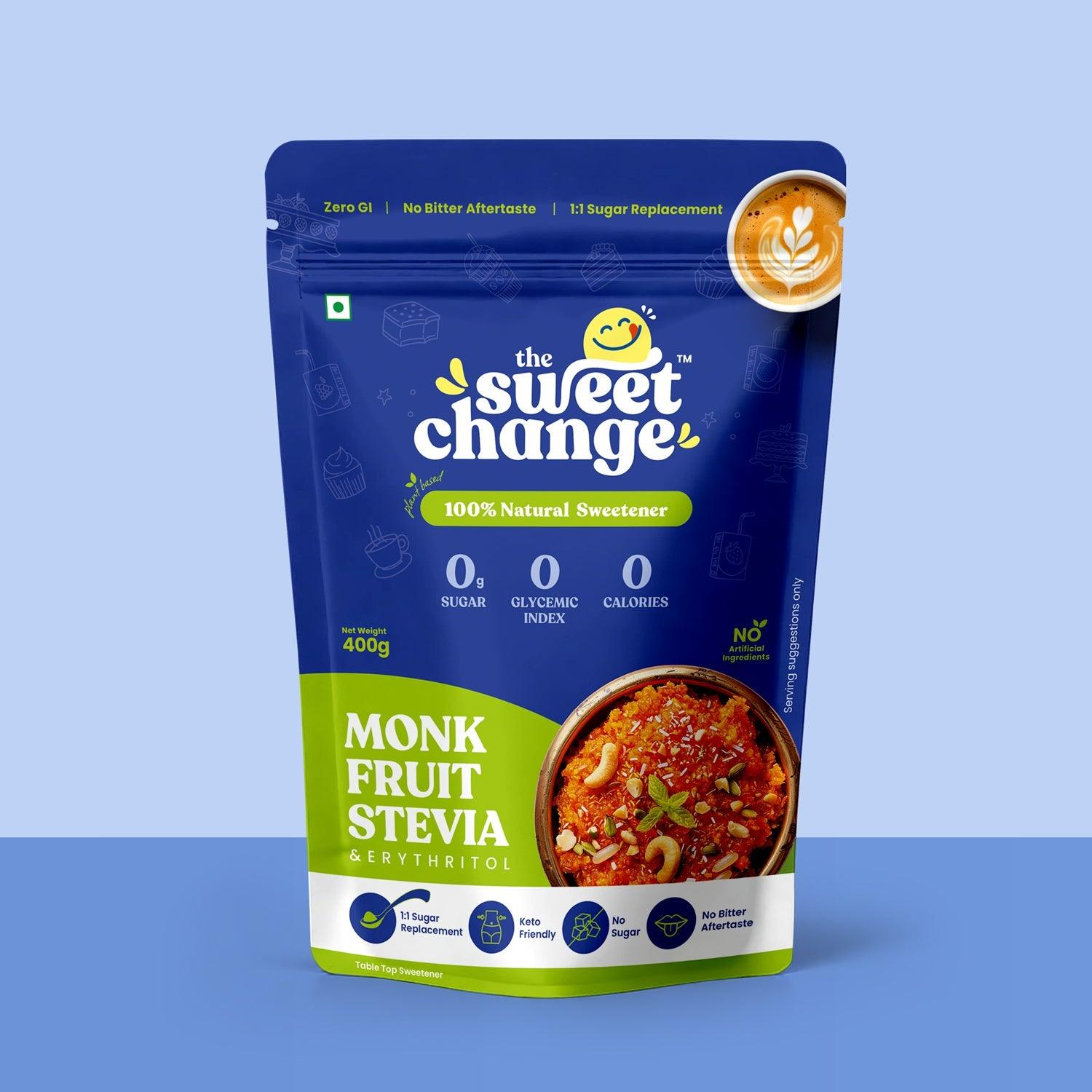
Natural Sweeteners That Are Good for Your Health
Share
Natural sweeteners like stevia, monk fruit, and erythritol are increasingly popular as healthier alternatives to refined sugar. Not only can they provide a sweet taste without the excess calories, but research also suggests they may offer potential health benefits, including better blood sugar control and lower blood pressure in certain individuals.
Cutting down on refined sugar isn’t always easy - especially when it’s hidden in so many everyday foods and drinks. But given the well-documented risks of excessive sugar intake, from weight gain and type 2 diabetes to heart disease, making the switch is worth it.
Fortunately, nature offers several sweeteners that are low in calories, low in fructose, and naturally sweet-tasting. These options can help you enjoy sweetness without the harmful effects of refined sugar, making them a great choice for anyone looking to improve their diet while still satisfying their sweet tooth.
Here are 3 natural sweeteners that could be healthier alternatives to refined sugar.
1. Stevia – A Natural Zero-Calorie Sweetener
Stevia is one of the most popular low-calorie natural sweeteners, extracted from the leaves of the Stevia rebaudiana plant. Native to South America, this plant has been cultivated for centuries for both its sweetness and medicinal properties.
Stevia leaves contain sweet compounds known as stevioside and rebaudioside A, which are hundreds of times sweeter than sugar gram for gram. This means you need only a tiny amount to achieve the same sweetness, making it virtually calorie-free.
Potential Health Benefits of Stevia
Several human studies suggest that stevia may have beneficial effects on important health parameters:
- Blood Pressure: Research indicates that stevia may help reduce high blood pressure in people with hypertension, while not significantly affecting normal or mildly elevated blood pressure levels.
- Blood Sugar Control: Stevia is a diabetic-friendly sweetener that can help maintain healthy blood sugar levels, making it a good alternative to sugar for people with type 2 diabetes or prediabetes.
Note: Some studies suggest that certain types of stevia may have an impact on the gut microbiome, but more research is needed to confirm these effects.
Taste and Usage
Stevia’s taste can vary depending on the brand and formulation. While some people dislike its aftertaste, others find it pleasant once they try a high-quality, well-formulated product. Experimenting with different brands can help you find the one that suits your taste.
Summary:
Stevia is a natural, plant-based, zero-calorie sweetener that may support both blood sugar management and blood pressure control. With careful brand selection, it can be a healthy, everyday sugar alternative for those looking to cut down on refined sugar without sacrificing sweetness.
2. Erythritol – A Low-Calorie, Diabetic-Friendly Sugar Alcohol
Erythritol is a low-calorie sweetener that belongs to the sugar alcohol family. It occurs naturally in certain fruits such as pears, grapes, and melons, though most commercial erythritol is produced via a fermentation process using glucose from cornstarch.
Erythritol has a taste profile that’s very close to sugar, with only a mild aftertaste, making it a popular choice for people looking to reduce sugar intake without sacrificing sweetness.
How Erythritol Works in the Body
Unlike regular sugar, erythritol:
- Does not spike blood sugar or insulin levels
- Does not impact cholesterol or triglyceride levels
- Is absorbed in the small intestine and excreted unchanged in the urine, meaning it provides almost zero calories
This makes erythritol an excellent option for diabetics, people on a low-carb or keto diet, and those aiming to manage their weight.
Digestive Tolerance and Side Effects
Erythritol is generally better tolerated than other sugar alcohols like xylitol or maltitol, causing fewer digestive issues. However, consuming large amounts at once - especially when combined with other sweeteners like fructose - may lead to bloating, gas, or diarrhea.
Recent Research and Controversies – Why the Evidence Is Still Weak
Erythritol has been widely considered safe for decades, but two recent studies have drawn media attention. On closer examination, however, these studies have significant limitations that make their findings far from definitive.
- Observational study in 264 young adults: This study found an association between higher blood erythritol levels and increased belly fat. However, it did not prove that consuming erythritol causes fat gain. Elevated erythritol can also occur naturally in the body through metabolic pathways, especially in people with certain genetic predispositions - meaning the presence of erythritol in the blood may be a marker rather than a cause.
- Small experimental study with 8 participants: In this trial, participants drank 30 g of pure erythritol dissolved in water - far more than a typical daily intake. Blood erythritol levels stayed elevated for several days, and researchers noted an association with increased clotting potential. But with such a tiny sample size, no control group, and an unrealistically high dose, these results cannot be generalized to normal dietary consumption.
Both studies were heavily based on lab experiments (in vitro and in vivo), not real-world human diets, and neither established a direct cause-and-effect relationship. Until large-scale, well-controlled human trials are conducted, these findings should be viewed as preliminary signals rather than conclusive evidence of harm.
Expert Verdict on Erythritol
Erythritol is a low-calorie, naturally occurring sugar alcohol that closely mimics the taste of sugar without causing significant spikes in blood glucose or insulin levels. Decades of research and real-world use suggest it is safe for people when consumed in moderate amounts. While recent small-scale studies have raised questions about potential long-term effects, their findings are based on unrealistically high doses, limited sample sizes, and preliminary laboratory data - not typical everyday consumption.
Importantly, erythritol has been reviewed and approved as safe by major international health authorities, including:
- U.S. Food and Drug Administration (FDA) – Classified as Generally Recognized as Safe (GRAS).
- European Food Safety Authority (EFSA) – Approved as a safe food additive (E968).
- World Health Organization (WHO) / Joint FAO–WHO Expert Committee on Food Additives (JECFA) – Evaluated and found no safety concerns at current consumption levels.
- Health Canada – Approved for use as a sweetener in foods and beverages.
- Food Standards Australia New Zealand (FSANZ) – Recognized as safe and permitted in various food categories.
For healthy adults, enjoying erythritol in tea, coffee, baking, or occasional desserts remains a practical and lower-calorie alternative to sugar. As with any sweetener, balance is key - pairing it with a nutrient-rich diet and whole foods will ensure you reap the benefits without over-reliance on added sweetness.
3. Monk Fruit Sweetener – The Zero-Calorie, Anti-Inflammatory Sugar Alternative
Monk fruit (Siraitia grosvenorii) is a small, green fruit native to Southeast Asia, particularly China and Thailand. For centuries, it has been used in Traditional Chinese Medicine (TCM) to soothe sore throats, cool the body, and promote overall wellness. Today, it is widely recognized for its role in producing monk fruit extract — a natural, zero-calorie sweetener.
Nutritional Profile & Health Benefits
Monk fruit extract contains compounds called mogrosides, which are intensely sweet — up to 150–250 times sweeter than sugar — but do not contain calories or carbohydrates. Research suggests that monk fruit may:
- Support blood sugar management – Does not cause spikes in blood glucose or insulin levels, making it suitable for people with diabetes or insulin resistance.
- Provide anti-inflammatory benefits – Mogrosides have been shown to reduce oxidative stress and markers of inflammation in lab studies.
- Aid weight management – Naturally calorie-free, it can help reduce overall daily calorie intake when replacing sugar in foods and drinks.
While human studies are limited, monk fruit extract is generally considered safe, with no known adverse effects in healthy individuals.
Important Considerations When Buying Monk Fruit
When purchasing monk fruit sweetener, always check the ingredient label. Many products are blended with other sweeteners such as maltodextrin, dextrose, or even sugar, which can negate its health benefits. For the best results:
- Choose 100% pure monk fruit extract or monk fruit blended with other natural low-calorie sweeteners like stevia or erythritol.
- Avoid products with artificial additives or fillers.
How Monk Fruit Compares to Other Natural Sweeteners
Other natural sweeteners, like honey, coconut sugar, molasses, and maple syrup, may contain trace minerals or antioxidants but are still high in fructose and calories. While they are better than refined sugar when used occasionally, they can still impact blood sugar levels and contribute to weight gain if overconsumed.
Global Safety Approvals
Monk fruit sweetener has been approved for use by major food safety organizations worldwide, including:
- U.S. Food and Drug Administration (FDA) – Classified as Generally Recognized as Safe (GRAS).
- Food Standards Australia New Zealand (FSANZ) – Approved for use as a tabletop sweetener and in various food categories.
- Health Canada – Recognized as a safe non-nutritive sweetener.
- Japan’s Ministry of Health, Labour and Welfare – Approved for food and beverage use for decades.
- Joint FAO/WHO Expert Committee on Food Additives (JECFA) – Concluded no safety concerns at current intake levels.
Expert Verdict on Monk Fruit
Monk fruit is one of the cleanest, safest, and most natural sugar alternatives available today. Its zero-calorie, zero-carb profile and potential anti-inflammatory effects make it an excellent choice for those managing diabetes, weight, or metabolic health. While more human research is needed to confirm its full range of benefits, existing data and long-standing traditional use make it a trustworthy option for reducing sugar intake without sacrificing sweetness.
💡 Pro Tip: For optimal health benefits, pair monk fruit with a nutrient-rich, whole-food diet and avoid blends with high-glycemic fillers.
The Bottom Line – Choosing the Right Sweetness for Your Health
Sugar itself isn’t inherently bad — in fact, our bodies rely on glucose for energy. The real concern is where your sugar comes from and how much of it you consume. Naturally occurring sugars from fruits, dairy, and whole grains come packaged with vitamins, minerals, fiber, and antioxidants, while added sugars in processed foods like sodas, candies, pastries, and sauces offer calories with no nutritional value. Over time, too much added sugar can contribute to weight gain, insulin resistance, heart disease, and type 2 diabetes.
That’s where natural sweeteners like stevia, erythritol, and monk fruit can make a meaningful difference. These options deliver the sweet taste you love without the blood sugar spikes, excessive calories, or long-term health risks associated with refined sugar. They are also widely recognized as safe by major health authorities such as the U.S. FDA, WHO, and JECFA.
The Sweet Change Promise – Pure, Natural, and Perfectly Balanced
At The Sweet Change, we believe that sweetness should be pure, natural, and guilt-free. That’s why our formulation uses only three premium ingredients — Monk Fruit, Stevia, and Erythritol — blended in precise proportions to create the perfect sugar alternative.
- 0 Calories – Enjoy your favorite drinks and desserts without adding extra calories.
- 0 Glycemic Index – No blood sugar spikes, making it ideal for people with diabetes or anyone managing their sugar intake.
- 0 Insulin Spike – Keeps your energy levels steady and supports better metabolic health.
We refuse to use artificial sweeteners, chemical additives, or synthetic fillers — only ingredients derived from nature, blended to give you the taste, texture, and satisfaction of sugar without the downsides.
Smart Strategies to Reduce Added Sugar Without Feeling Deprived
- Choose natural sweeteners wisely – Opt for stevia, monk fruit, or erythritol instead of refined sugar.
- Prioritize whole foods – Fruits, vegetables, whole grains, lean proteins, dairy, nuts, and seeds should form the foundation of your diet.
- Rethink your drinks – Cut back on soda, energy drinks, sweet teas, and fruit juices.
- Use fruit as a natural sweetener – Add mashed banana to oatmeal, dates to smoothies, or applesauce to baked goods.
- Blend sweeteners – If you’re adjusting your palate, mix small amounts of sugar with natural sweeteners until you adapt to the taste.
Your Expert Verdict
A balanced diet doesn’t mean cutting out sweetness entirely - it means making better choices about where that sweetness comes from. Natural sweeteners like stevia, erythritol, and monk fruit - especially when combined in a clean, carefully crafted blend like The Sweet Change - allow you to enjoy desserts, coffee, and baked goods without sabotaging your health goals.
By focusing on whole, nutrient-dense foods and using these low-calorie, low-glycemic sweeteners in moderation, you can reduce your added sugar intake, support your metabolic health, and still satisfy your sweet tooth.
Final Takeaway: Switch to healthier sweeteners, limit highly processed foods, and enjoy your favorite treats in moderation - because lasting health is built on balance, not deprivation.
1. What are the healthiest natural sweeteners?
The healthiest natural sweeteners include stevia, monk fruit, and erythritol. These sweeteners have zero or very low calories, a low glycemic index, and do not spike blood sugar, making them ideal for diabetics, weight management, and overall health. They are also approved as safe by major food authorities like the FDA and WHO.
2. Is erythritol safe for daily use?
Yes, erythritol is generally safe for daily use when consumed in moderate amounts. It has zero glycemic impact, is tooth-friendly, and does not cause blood sugar or insulin spikes. Global health agencies such as the FDA, EFSA, and JECFA have approved it as safe. While excessive intake can cause mild digestive discomfort, moderate use in beverages, baking, or desserts is well-tolerated.
3. Can stevia, monk fruit, and erythritol help with weight loss?
Yes. All three — stevia, monk fruit, and erythritol — are low-calorie or zero-calorie sweeteners that can replace refined sugar, helping reduce daily calorie intake. They also prevent blood sugar fluctuations, which can reduce cravings and help with appetite control, supporting long-term weight management.
4. Are natural sweeteners safe for diabetics?
Absolutely. Sweeteners like stevia, monk fruit, and erythritol have a glycemic index of zero, meaning they won’t raise blood sugar levels. This makes them excellent sugar alternatives for people with type 2 diabetes, prediabetes, or insulin resistance. In fact, many nutritionists recommend them as part of a balanced diabetic-friendly diet.
5. Why choose The Sweet Change sweetener over other brands?
The Sweet Change blends stevia, monk fruit, and erythritol in precise proportions for the perfect sugar-like taste — with 0 calories, 0 glycemic index, and no insulin spike. Unlike other brands, we refuse to use artificial additives or fillers, ensuring you get a pure, natural, and healthy sugar substitute that’s safe for daily use.
Reference Links :
https://pmc.ncbi.nlm.nih.gov/articles/PMC4995183/
https://pmc.ncbi.nlm.nih.gov/articles/PMC5093271/
https://pmc.ncbi.nlm.nih.gov/articles/PMC7585782/
https://pmc.ncbi.nlm.nih.gov/articles/PMC5756564/
https://pubmed.ncbi.nlm.nih.gov/28484010/
https://www.nature.com/articles/s41591-023-02223-9
https://pmc.ncbi.nlm.nih.gov/articles/PMC7008860/
https://pubmed.ncbi.nlm.nih.gov/30877761/
https://pmc.ncbi.nlm.nih.gov/articles/PMC5756564/
https://pmc.ncbi.nlm.nih.gov/articles/PMC4995183/
https://pmc.ncbi.nlm.nih.gov/articles/PMC5756564/
https://pmc.ncbi.nlm.nih.gov/articles/PMC5093271/
https://pubmed.ncbi.nlm.nih.gov/28484010/
https://www.nature.com/articles/s41591-023-02223-9
https://www.healthline.com/nutrition/healthy-natural-sweeteners
https://pubmed.ncbi.nlm.nih.gov/29772560/

Country Head-Baby Nutrition -Ex Danone | Ex-Wockhardt



 https://www.linkedin.com/in/rajeev-agnihotri-a7094425?utm_source=share&utm_campaign=share_via&utm_content=profile&utm_medium=ios_app
https://www.linkedin.com/in/rajeev-agnihotri-a7094425?utm_source=share&utm_campaign=share_via&utm_content=profile&utm_medium=ios_app